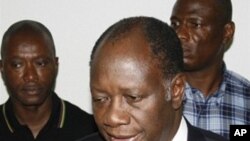Ivory Coast's military has sealed the country's borders as the president is challenging election results that show him losing to a former prime minister. The country's Constitutional Council says it will now decide who won the vote.
Three-and-a-half days after Sunday's presidential vote, the country's electoral commission announced former prime minister Alassane Ouattara as the winner.
Commission chairman Youssouf Bakayoko says Ouattara won more than 54 percent of the vote, defeating President Laurent Gbagbo. Bakakoyo said those results have now been forwarded to the constitutional council for validation.
But because the electoral commission missed its deadline for declaring a provisional winner, council chief Paul Yao N'Dre says the commission's announcement is illegal.
N'Dre says the electoral commission's mandate has expired, so it is not authorized to announce anything. N'Dre says the constitutional council will now resolve electoral disputes.
N'Dre is a long-time ally of President Gbagbo. The Gbagbo campaign is asking the council to annul results from northern provinces where they say Ouattara supporters engaged in fraud. The Ouattara campaign says the president is trying to hold on to power by force.
Given the margin of victory announced by the electoral commission, the constitutional council would have to annul nearly 400,000 votes to make President Gbagbo the winner.
Following N'Dre's announcement, Ivory Coast's military sealed the country's land, sea, and air borders. A state decree banned all foreign radio and television broadcasts indefinitely.
Cable news channels France24 and Africa24 are off the air, but the CNN signal continues. Those news outlets, along with many others, reported on the electoral commission's announcement that Mr. Ouattara won the election.
But not state-run television. Instead, the evening news featured an interview with N'Dre who said foreign news channels are amusing themselves giving results that are null and void.
The U.N. Security Council says it is ready to take appropriate measures against those who obstruct the electoral process.
Former U.S. President Jimmy Carter had election observers here. In a written statement, he said those challenging the results should provide evidence quickly so disputes can be resolved peacefully and promptly.
Military Seals Borders as Ivory Coast President Challenges Election Results




